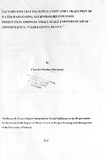| dc.contributor.author | Muchemi, Charles M | |
| dc.date.accessioned | 2012-11-28T12:28:14Z | |
| dc.date.available | 2012-11-28T12:28:14Z | |
| dc.date.issued | 2012 | |
| dc.identifier.uri | http://erepository.uonbi.ac.ke:8080/xmlui/handle/123456789/7293 | |
| dc.description.abstract | In 2006 the Water Harvesting for Food Security Project was conceptualized by the Ministry of Agriculture in order to address the problem of over reliance on rain fed agriculture by demonstrating simple water harvesting technologies to small scale farmers throughout the country but especially in the arid and semi arid lands. The farmers were expected to replicate and use the technologies in their own farms in order to help them achieve the envisioned multiplier effects. This study investigated why the replication and utilization of water harvesting technologies by the small scale farmers in Kieni Constituency, Nyeri County was low and came up with measures to improve the situation.
The objectives of the research were to determine how socio- economic factors, land sizes and land tenure systems, cost of water harvesting technologies, and sustainable utilization of the harvested water influenced replication and utilization of water harvesting technologies.The study used a descriptive survey design and information was collected using interviews and predetermined questions. One set of questionnaires was administered to household heads and captured data in order to help in finding out the factors influencing replication and utilization of water harvesting technologies and also to get information on the socio-economic status of the households.
The second set of questionnaire was administered to extension officers in order to get information on their perception on the factors influencing replication and use of water harvesting technologies and also to validate findings from the households. According to the study, youth were not adequately engaged in farming and their use of water harvesting technologies was low. The older farmers with higher education levels used the technologies more.
Use of water harvesting technologies increased with increasing farmers' income and access to credit. Farmers with individual land ownership invested more in water harvesting technologies as are farmers with bigger land holdings. The perception among the farmers that water harvesting technologies are very expensive need to be addressed through training and by introduction of high value crops e.g. capsicum, tomatoes and onions to justify the high costs of construction. This study will contribute to the development of knowledge on the role of water harvesting technologies towards increasing agricultural production and the need to continue investing in these technologies sustainably. | en_US |
| dc.language.iso | en_US | en_US |
| dc.publisher | University of Nairobi, Kenya | en_US |
| dc.title | Factors influencing replication and utilization of water harvesting technologies for food production amongst small scale farmers in Kieni Constituency, Nyeri County, Kenya | en_US |
| dc.title.alternative | Thesis (MA) | en_US |
| dc.type | Thesis | en_US |

